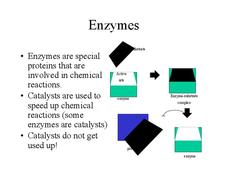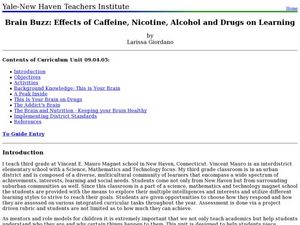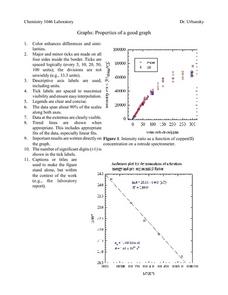Cmassengale
Bacteria: Structure and Function
For as small as they are, there sure is a lot of information for young scientists to learn about bacteria. Help simplify the subject with this instructional presentation that explores the structure, nutrition, and reproduction of...
Curated OER
Survival: The Human Body in Extreme Environments
Students create a list of signs the human body gives during threatening weather conditions. They investigate the causes and conditions of dehydration, overheating, and hypothermia.
Curated OER
Science Jeopardy
Wow! Review an entire semester of biology curriculum playing this Science Jeopardy game! The variety of topics is extremely broad, so you will need to review each question to find if they all apply to your course. As you find material...
Curated OER
Dirt Babies
Dirt babies are an excellent way to show young botanists the plant life cycle. They explore the functions and industry behind grasses before growing some of their own. Use the informational text here and consider implementing some...
Curated OER
Enzymes
With the help of this pair of slides, biology learners will be able to define enzymes and explain the optimal conditions for functioning. The first slide, with simple graphics, shows how enzymes function as catalysts for chemical...
Curated OER
Prokaryotes
Although these slides are text rich, the summaries of prokaryote characteristics will be useful. There are diagrams of preferred cell conditions and your students will find all the basic definitions of structure and functions...
Curated OER
Cell Discoveries
Students observe, compare and describe cell organelles in terms of their function, structure and operation. They enter and edit information in a database, build and sort a student-designed database and find records in a database.
Curated OER
Two-Cell Battery
Students build their own two-cell battery and determine which electrolyte solution is best suited for making a battery. They discuss background information for their experiment, construct and test their battery, and using the chart on...
Curated OER
Resistors
In this resistors worksheet, students answer 11 questions about resistors, their functions, symbols used to represent them, and they calculate resistance values.
Curated OER
Physics of Sound: How We Hear Sounds
Learners examine the way they hear sounds. In groups, they label and identify the functions of the different parts of the ear. After reading a book by Helen Keller, they research the mechanisms of sound and how sounds are different...
Curated OER
Plant Hormones
Students identify different plant hormones and explain their function in plant development. In this biology lesson, students investigate how IAA affect root growth. They study the history of auxin discovery.
Curated OER
Brain Buzz: Effects of Caffeine, Nicotine, Alcohol and Drugs on Learning
Students understand how the brain functions and how they can promote a healthy lifestyle. In this health lesson students complete several activities including investigating how stimulates affect the brain.
Curated OER
Physics of Sound: How We Hear Sounds
Second graders identify the different function and parts of the ear. In this physics lesson, 2nd graders explain how we hear sound. They read about the life of Helen Keller and respond to questions that follow.
Urbana School District
Optics
Don't worry, optics is a light topic! The presentation covers reflection, refraction, fiber optics, mirages, prisms, rainbows, dispersion, mirrors, lenses, telescopes, diffraction, the human eye, and much, much more. Presentation is...
Curated OER
The Skeletal System
Students identify bones off a skeleton during quizzes; assemble disarticulated skeletons; bird, frog and rat. They dissect frogs, remove the muscle tissue, and identify of bones.
Curated OER
Relief Maps
Students study geographical maps and their functions. In this geography lesson students work in groups to build a map to scale.
Curated OER
Salt Water Wedge
Students conduct an experiment to observe the properties of both salt and freshwater. They explain why freshwater will stay at the surface while salt water will travel up a river bottom because of density. Students also research the...
Curated OER
Study of the Cell
Students draw a diagram to show the fluid mosaic model of a membrane. They explain how hydrophobic and hydrophilic properties help membranes hold their shape. They identify the functions of different cell membrane proteins as well.
Curated OER
Take a Dip: The Water in Our Lives
Students explore the function of storm drains and the importance of keeping them clean of debris. They obtain permission from local authorities and perform community service painting stenciled messages near existing storm drains.
California Academy of Science
Colorful Fish Adaptations
I love lessons that incorporate the arts, they're so engaging and address a more diverse set of learners. Your class will investigate the reasons fish from the coal reef have adapted such colorful fins. They design a fish that uses color...
Intel
Insects: The Good, The Bad, The Ugly
What would the world be like with no insects? Ponder this question using a research-based STEM unit that encourages scholars to investigate insects from both a beneficial and hazardous perspective. They learn about insect behaviors,...
Curated OER
Properties of a Good Graph
In this chemistry worksheet, learners examine the common characteristics of an acceptable graph that is meant to be used to display data.
Curated OER
Tissues
Complete with teachers' notes for most of the slides, this is a tremendous presentation of the four types of tissues: epithelial, connective, nerve, and muscle. Each is displayed with pertinent vocabulary and photos of microscope slides...
Curated OER
Exploring the Solar System: All About Spacecraft/Spaceflight
Rarely do you find resources that reach high school astronomy learners. Here is something at their level! The physics of flyby missions is explained via several examples. Landing, penetrating, and roving spacecraft are examined. Diagrams...























